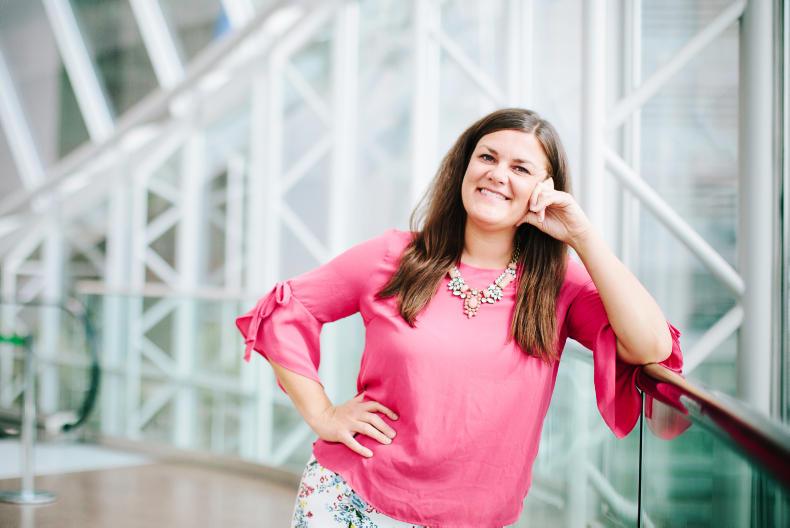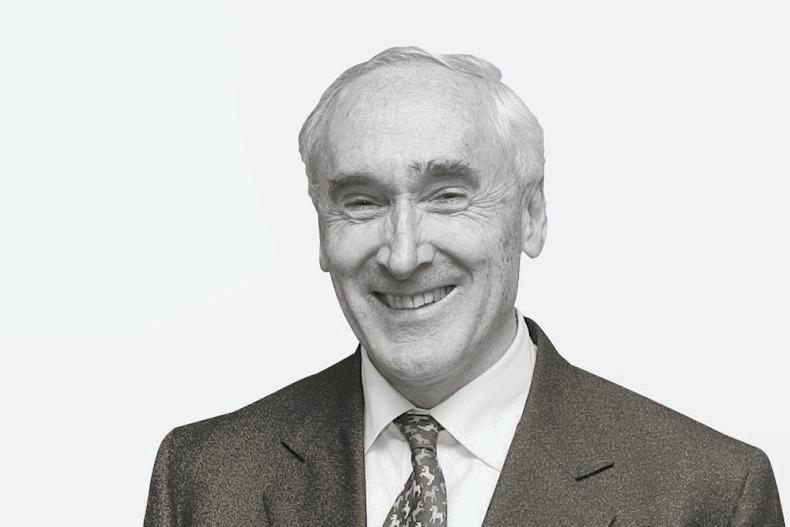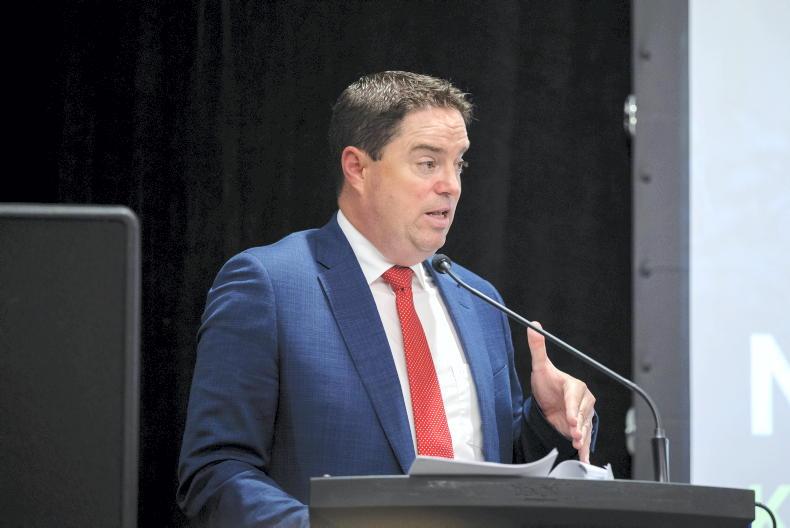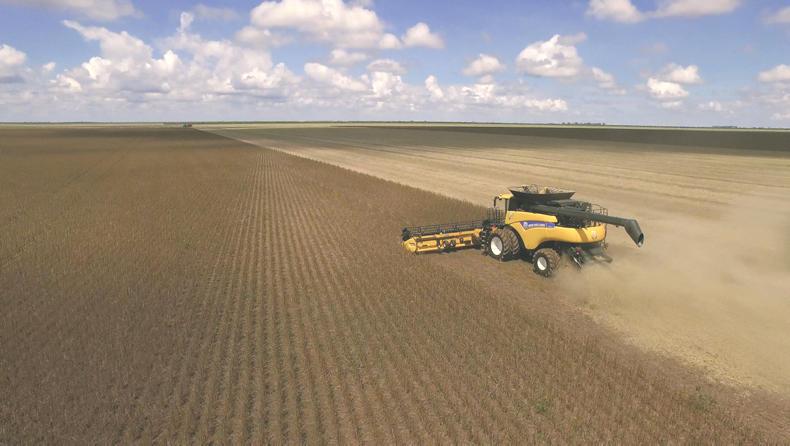Although she enjoyed growing up around friends’ farms in Wisconsin, Michelle Miller never envisioned a future in farming. Although her high-school aptitude test advised her to study agriculture, she took the fashion route instead, going on to work in Gucci on Rodeo Drive.
Michelle became a typical city slicker, moving around big cities in the US, and bought into what she now considers to be a lot of misconceptions surrounding food. “I was the big-city girl that feared her food. I used to spend way too much money on groceries. I was the girl living in Chicago or Los Angeles paying $6 for a dozen eggs and thinking I had to buy organic.
“Then I moved to Iowa for my ‘Prince Farming’. After living and working on the farm, and talking to actual farmers, I realised that everything I thought that I knew was wrong. I got really upset about the fact that I felt I was duped and ripped off. Don’t mess with me, don’t lie to me,” laughs Michelle jokingly.

Michelle Miller, aka the Farm Babe, started her social media campaign after being banned by the Food Babe. \ Rita Slattery
Having met her boyfriend Doug six years ago, Michelle has been living and working with him on his farm for the past four years. They rear Angus cattle and Suffolk sheep, as well as growing genetically modified (GM) corn and soya beans, something that proved to be a bone of contention for the couple in the beginning.
“When Doug and I first got together and I learned that he was growing genetically modified organisms (GMOs), I was like, ‘There’s no way. How could this great guy be growing something so terrible?’” she recalls.
Upon getting first-hand experience on the farm and learning that almost 95% of corn and soya beans in the US are GM, Michelle’s views changed drastically.
“If there is a way for us to grow more crop on less land, using less chemical, using fewer inputs, of course we’re going to do it. If organic was better, if non-GMO was better, we would all be doing it. So the proof is in the pudding, there are decades worth of field trials and research coming from agronomists, people with PhDs and scientists.
“I think people forget sometimes that farmers are real people. They are just like: ‘Oh, corporate America, you can’t trust the Government.’ It’s like: ‘Ya, okay, I get that, I understand your scepticism, but why would we grow something that we wouldn’t feed to our own families?’ It makes no sense.”
The Farm Babe
As Michelle got more involved in agriculture, she began to challenge the voices of people who perpetuate farming myths, particularly those who did so online. This ultimately led to her starting her own web-based outreach – the Farm Babe – a brand with over 90,000 followers across social media platforms.
“The name was a spin-off of the Food Babe. I discovered the Food Babe almost four years ago now. I had commented on an article she shared about how GMOs were drenched in toxic chemicals. I said: ‘No, you know, that’s not really how it works. We’re farmers. Here’s how we spray and what we spray.’

Michelle Miller, aka the Farm Babe, started her social media campaign after being banned by the Food Babe. \ Rita Slattery
“I made a very conscious point to leave a very nice, respectful and kind comment,” remarks Michelle. “So I’m like: ‘I would really like to have a conversation with you. I would love to connect you with some farmers from who you can learn more about this, how our food is really safe and not drenched.’
“Anyways, I left that comment and I was banned from her social media page straight away. I found a Facebook group called ‘Banned by Food Babe’, which has 10,000 members. If you have science on your side, you don’t have to silence people because you have the facts. You can’t challenge her views, because she just shuts you out. So I said fine, if you’re not letting farmers talk about farming, by all means, I’ll be the Farm Babe then.”
Sitting down with Irish Country Living following her keynote speech at the International Association for Plant Biotechnology Congress in Dublin recently, Michelle explains that the Farm Babe came to be known as a myth debunker. She discusses topics from GM crops, to food labelling and antibiotic-free meat, with the aim of making science accessible.
“I explained how we spray our fields, that it is at a rate of 22 ounces per acre, so you are looking at two [small] beer cans on an area of land the size of an American football field. We only spray two days of an entire year. I think that was the first post I did that went viral.
“I would say, in America, probably about 80% of food labels are BS. They are really misleading. For example, antibiotic-free meat: if you use antibiotics on livestock, by law there’s a withdrawal period before the animal can go to market. Which means that all meat is antibiotic-free. So sometimes food companies will put out these antibiotic-free labels so they can charge more money.”
As with anything in life, you should always go to the source. If you want to fix your car, you go to your mechanic, you don’t go to your dentist. A lot of times the misinformation that is running rampant is coming from people who probably don’t even know the difference between a Holstein and an Angus
Fear culture
A lot of the misrepresentation in the public domain regarding food, Michelle believes, comes from a culture of fear created by food companies and activists. “Sex used to sell, now fear is the new sex when it to comes to selling,” she observes.
In challenging these issues, Michelle thinks the way forward is for people to digest information from credible sources only, as well as giving farmers the correct platforms in the mainstream media to discuss their work.
“As with anything in life, you should always go to the source. If you want to fix your car, you go to your mechanic, you don’t go to your dentist,” says Michelle. “A lot of times the misinformation that is running rampant is coming from people who probably don’t even know the difference between a Holstein and an Angus.
“The activist groups, like the go-vegan groups, put out a lot of scaremongering and fearmongering. I think you should always ask farmers about farming, just like you would in any industry.”
Far from the big city, Michelle is glad to take on the persona of the Farm Babe and is certainly content with the life she now leads. “The quiet life, eating what we grow, living off the grid a little bit and being on the farm out in the country where it’s quiet and peaceful, I just love it. I really love what I do.”
Read more
Many biotechnology tools offer little to EU producers
Hijacking of term ‘sustainable’ by anti-GMO groups misleading – UCC scientists
Although she enjoyed growing up around friends’ farms in Wisconsin, Michelle Miller never envisioned a future in farming. Although her high-school aptitude test advised her to study agriculture, she took the fashion route instead, going on to work in Gucci on Rodeo Drive.
Michelle became a typical city slicker, moving around big cities in the US, and bought into what she now considers to be a lot of misconceptions surrounding food. “I was the big-city girl that feared her food. I used to spend way too much money on groceries. I was the girl living in Chicago or Los Angeles paying $6 for a dozen eggs and thinking I had to buy organic.
“Then I moved to Iowa for my ‘Prince Farming’. After living and working on the farm, and talking to actual farmers, I realised that everything I thought that I knew was wrong. I got really upset about the fact that I felt I was duped and ripped off. Don’t mess with me, don’t lie to me,” laughs Michelle jokingly.

Michelle Miller, aka the Farm Babe, started her social media campaign after being banned by the Food Babe. \ Rita Slattery
Having met her boyfriend Doug six years ago, Michelle has been living and working with him on his farm for the past four years. They rear Angus cattle and Suffolk sheep, as well as growing genetically modified (GM) corn and soya beans, something that proved to be a bone of contention for the couple in the beginning.
“When Doug and I first got together and I learned that he was growing genetically modified organisms (GMOs), I was like, ‘There’s no way. How could this great guy be growing something so terrible?’” she recalls.
Upon getting first-hand experience on the farm and learning that almost 95% of corn and soya beans in the US are GM, Michelle’s views changed drastically.
“If there is a way for us to grow more crop on less land, using less chemical, using fewer inputs, of course we’re going to do it. If organic was better, if non-GMO was better, we would all be doing it. So the proof is in the pudding, there are decades worth of field trials and research coming from agronomists, people with PhDs and scientists.
“I think people forget sometimes that farmers are real people. They are just like: ‘Oh, corporate America, you can’t trust the Government.’ It’s like: ‘Ya, okay, I get that, I understand your scepticism, but why would we grow something that we wouldn’t feed to our own families?’ It makes no sense.”
The Farm Babe
As Michelle got more involved in agriculture, she began to challenge the voices of people who perpetuate farming myths, particularly those who did so online. This ultimately led to her starting her own web-based outreach – the Farm Babe – a brand with over 90,000 followers across social media platforms.
“The name was a spin-off of the Food Babe. I discovered the Food Babe almost four years ago now. I had commented on an article she shared about how GMOs were drenched in toxic chemicals. I said: ‘No, you know, that’s not really how it works. We’re farmers. Here’s how we spray and what we spray.’

Michelle Miller, aka the Farm Babe, started her social media campaign after being banned by the Food Babe. \ Rita Slattery
“I made a very conscious point to leave a very nice, respectful and kind comment,” remarks Michelle. “So I’m like: ‘I would really like to have a conversation with you. I would love to connect you with some farmers from who you can learn more about this, how our food is really safe and not drenched.’
“Anyways, I left that comment and I was banned from her social media page straight away. I found a Facebook group called ‘Banned by Food Babe’, which has 10,000 members. If you have science on your side, you don’t have to silence people because you have the facts. You can’t challenge her views, because she just shuts you out. So I said fine, if you’re not letting farmers talk about farming, by all means, I’ll be the Farm Babe then.”
Sitting down with Irish Country Living following her keynote speech at the International Association for Plant Biotechnology Congress in Dublin recently, Michelle explains that the Farm Babe came to be known as a myth debunker. She discusses topics from GM crops, to food labelling and antibiotic-free meat, with the aim of making science accessible.
“I explained how we spray our fields, that it is at a rate of 22 ounces per acre, so you are looking at two [small] beer cans on an area of land the size of an American football field. We only spray two days of an entire year. I think that was the first post I did that went viral.
“I would say, in America, probably about 80% of food labels are BS. They are really misleading. For example, antibiotic-free meat: if you use antibiotics on livestock, by law there’s a withdrawal period before the animal can go to market. Which means that all meat is antibiotic-free. So sometimes food companies will put out these antibiotic-free labels so they can charge more money.”
As with anything in life, you should always go to the source. If you want to fix your car, you go to your mechanic, you don’t go to your dentist. A lot of times the misinformation that is running rampant is coming from people who probably don’t even know the difference between a Holstein and an Angus
Fear culture
A lot of the misrepresentation in the public domain regarding food, Michelle believes, comes from a culture of fear created by food companies and activists. “Sex used to sell, now fear is the new sex when it to comes to selling,” she observes.
In challenging these issues, Michelle thinks the way forward is for people to digest information from credible sources only, as well as giving farmers the correct platforms in the mainstream media to discuss their work.
“As with anything in life, you should always go to the source. If you want to fix your car, you go to your mechanic, you don’t go to your dentist,” says Michelle. “A lot of times the misinformation that is running rampant is coming from people who probably don’t even know the difference between a Holstein and an Angus.
“The activist groups, like the go-vegan groups, put out a lot of scaremongering and fearmongering. I think you should always ask farmers about farming, just like you would in any industry.”
Far from the big city, Michelle is glad to take on the persona of the Farm Babe and is certainly content with the life she now leads. “The quiet life, eating what we grow, living off the grid a little bit and being on the farm out in the country where it’s quiet and peaceful, I just love it. I really love what I do.”
Read more
Many biotechnology tools offer little to EU producers
Hijacking of term ‘sustainable’ by anti-GMO groups misleading – UCC scientists












SHARING OPTIONS